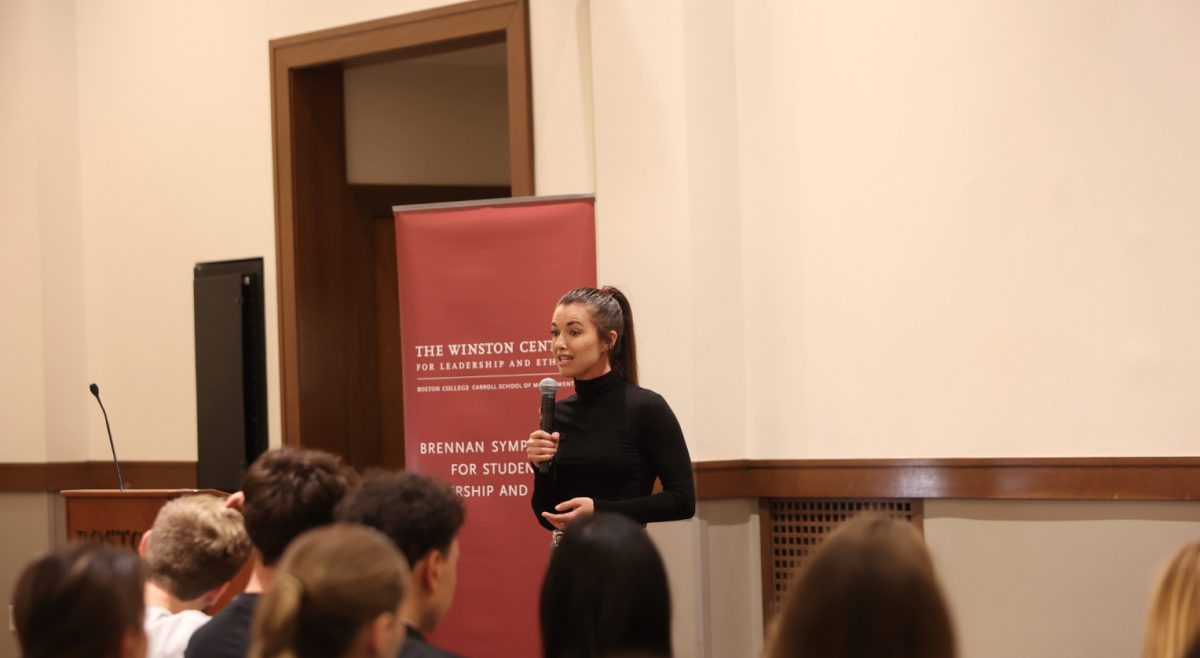The Undergraduate Government of Boston College Senate voted down two separate resolutions at a senate meeting on Tuesday. The first resolution called for a re-vote on the president pro tempore position following concerns over the behavior of the current president pro tempore, Crystal Pu, Lynch ’20. The second resolution advocated for a review board for grants to BC following the backlash over potential funding to the political science department by the controversial Charles Koch foundation. The resolution also would have condemned the University for accepting the funding.
The resolution to hold another election for the president pro tempore position, presented by a UGBC senator, was debated and voted on in an executive session—meaning the deliberations were strictly confidential. The senator who presented the resolution said that the resolution did not call for an impeachment, rather for a re-vote next semester—it would be possible for Pu to be re-elected.
The resolution would have needed a two-thirds vote to pass, as it would have required an edit to the UGBC handbook.
The written resolution expressed concerns that Pu was not acting efficiently in her position and was causing delays in meetings because of her disorganization, but some senators expressed that they believed the true issue did not lie in her inefficiency, but in her lack of respect, specifically for Tiffany Brooks, UGBC vice president and MCAS ’21.
Some senators said that while Pu had been successful in her previous role as a senator, they thought that she had not properly met the requirements of president pro tempore and should be forced to run for the position again. Other senators said that a re-election was not the right approach to solving the issue of disrespect—she should instead just be verbally condemned.
The second resolution, focused on the Koch funding, was co-sponsored by John Gehman and Laura Perrault, both UGBC senators and MCAS ’21.
Charles Koch, who made up the “Koch brothers” along with his late brother David, is the billionaire owner, chairman, and CEO of Koch Industries, the second-largest privately held company in the United States that, among other things, manufactures, refines, and distributes petroleum.
The Charles Koch Foundation has proposed funding a new program within the political science department focused on new perspectives of foriegn policy—many faculty members have taken issue with this because of the Koch brothers’ controversial political history. The current vision statement for the program states that the grant could create public speaker programs, undergraduate workshops, and fellowships for graduate students.
The resolution encouraged the University not to accept the Koch funding, citing reasons that included the foundation’s lobbying against climate change advocacy. It stated that the acceptance of this funding would undermine BC’s Jesuit values and contradict BC’s fight for social justice. The resolution also called for the creation of a committee consisting of both students and faculty to help the administration review potential grants and gifts.
Perrault said in an interview that members from Faculty for Justice, a faculty group that promotes social justice on campus, had reached out to them with concerns about the potential Koch funding. She said that after doing some research, she believed there wasn’t enough information released by the University about the potential grant.
“BC has the right to make that decision, but they should be more upfront, vocal, and transparent with students about it,” Perrault said. “So if BC had just handled it by coming out and saying, ‘Listen, we’re accepting this amount of money, and it’s going to this specific part of the political science department that won’t get funding otherwise,’ then I think it would have been a completely different conversation.”
While debating the resolution, Dennis Wieboldt, UGBC senator and MCAS ’23, said that the current system for the administration reviewing gifts and grants is very unclear.
“There’s no stated policies about how they’re going to review grants, how they’re going to review the Koch grant, or how they’ve reviewed grants in the past,” Wieboldt said. “So we’re really examining the lack of procedure in place.”
Perrault said that though the concern was initially started by the Koch funding, their resolution is more broadly aimed at addressing all grants that come through the University.
“Obviously the faculty is affected by this, but students are as well,” Perrault said. “Their education is tied to the money that we’re receiving, so having some sort of formal body would allow students as well as faculty to be in on that process of accepting this money and the implications it would have. So although it was sparked by the Koch funding, it’s more about having this sort of review board that can go over the funding and give a student perspective before BC accepts it.”
Kerry Soropoulos, UGBC at-large senator and MCAS ’23, expressed during the debate that he believes a review board consisting of students and faculty could dissuade potential donors, an opinion that many other senators agreed with.
“Do we really want to say to our constituents that our legacy is we’ve made it more difficult to give more money to BC?,” Soropoulos asked. “Is that really what we’re aiming at? This is adding more hoops and rings for people to jump through when they’re simply trying to donate money to BC.”
The resolution failed to pass, receiving 14 votes for and 13 votes against with one abstention—passing the resolution would have required half the votes plus one.
Featured Image Celine Lim / Heights Editor



















